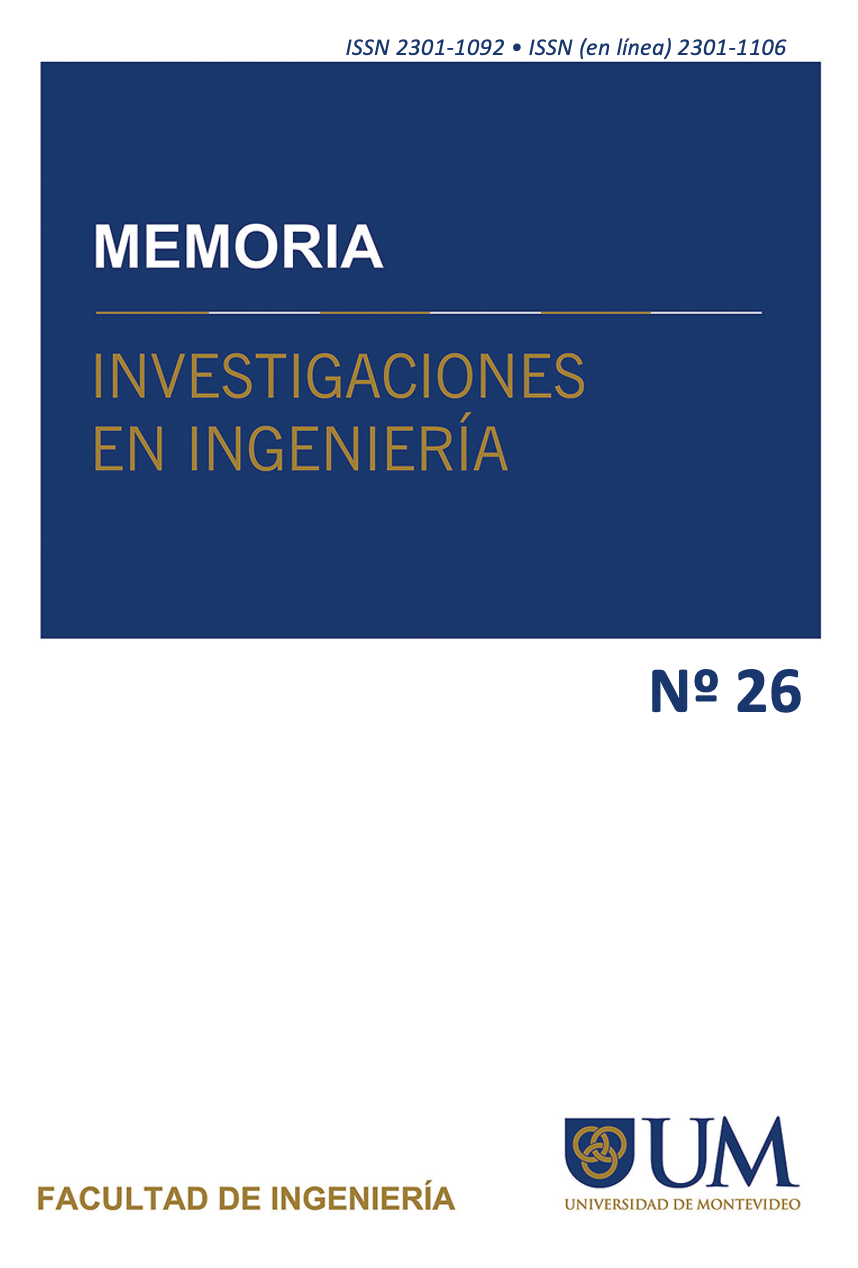Reduzindo o consumo de energia do compressor de refrigeradores usando nanopartículas de óxido de aAlumínio
DOI:
https://doi.org/10.36561/ING.26.3Palavras-chave:
Refrigeração, Nanopartículas, Lubrificante, Compressor, EnergiaResumo
A refrigeração tornou-se parte integrante do nosso dia a dia e pode ser considerada um processo quase impossível de substituir. Portanto, a única forma de tornar esse processo eficiente é reduzir o consumo de energia dos componentes do refrigerador. Uma maneira de fazer isso é reduzir o consumo de energia do compressor adicionando nanopartículas a um refrigerante ou lubrificante. Este estudo tem como foco a produção de nanolubrificante (Al2O3/lubrificante sintético) e a dispersão do nanolubrificante no compressor R-134a. Este estudo investiga quanta energia pode ser reduzida quando nanopartículas de óxido de alumínio (Al2O3) são dispersas em lubrificante SL-32 (líquido base). Foi feita uma comparação entre o lubrificante SL-32 com e sem adição de nanopartículas de óxido de alumínio e mostrou uma redução de 0,913% no consumo de corrente e 2,74% na potência na mesma temperatura inicial de 31° C em ambos os casos. Portanto, pode-se concluir que nanopartículas de alumina podem ser utilizadas para reduzir a energia utilizada pelos compressores, criando um nanolubrificante com lubrificante SL-32.
Downloads
Referências
S. Comstock, "HALOCARBON REFRIGERATION SYSTEMS," in ASHRAE HANDBOOK, Atlanta, Stephen Comstock, 2014, p. 1.
W. F. Stoecker, "Applications of Refrigeration and Airconditioning," in Refrigeration and Air conditioning (2nd Edition), McGraw-Hill, 1986, p. 12.
Y. A. Cengel, "THE SECOND LAW OF THERMODYNAMICS," in Thermodynamics: An Engineering Approach (5th Ed), McGraw-Hill, 2006, p. 287.
Stephen U. S. Choi and J. A.Eastman, "Enhancing thermal conductivity of fluids with nano particles," ASME International Mechanical Engineering Congress & Exposition, 1995.
A. Majgaonkar, "Use of nanoparticles in refrigeration systems: a literature review paper," in International Refrigeration and Air Conditioning Conference, 2016.
M. Hatami and D. Jing, Nanofluids: Mathematical, Numerical, and Experimental Analysis, Elsevier, 2020.
G. H. Hundy, A. R. Trott and T. C. Welch, "Oil in Refrigerant Circuits," in Refrigeration and air-conditioning, Butterworth-Heinemann, 2008, pp. 89-98. DOI: https://doi.org/10.1016/B978-0-08-100647-4.00005-X
W. Yu and H. Xie, "A review on nanofluids: preparation, stability mechanisms, and applications," Journal of nanomaterials, 2012. DOI: https://doi.org/10.1155/2012/435873
L. J. Akinlesi, D. S. Adelekan, O. S. Ohunakin, O. E. Atiba, J. Gill and A. A. Atayero, "Experimental performance of a domestic refrigerator with TiO2-nanoparticles operating within selected ambient temperature," Journal of Physics, vol. 1378, no. 4, 2019. DOI: https://doi.org/10.1088/1742-6596/1378/4/042081
N. Subramani and M. J. Prakash, "Experimental studies on a vapour compression system using nanorefrigerants," International Journal of Engineering, Science and Technology, vol. 3, no. 9, pp. 95-102, 2011. DOI: https://doi.org/10.4314/ijest.v3i9.8
V. Nair, A. D. Parekh and P. R. Tailor, "Experimental investigation of a vapour compression refrigeration system using R134a/Nano-oil mixture," International Journal of Refrigeration, vol. 112, pp. 21-36, 2020. DOI: https://doi.org/10.1016/j.ijrefrig.2019.12.009
C. S. Jwo, L. Y. Jeng, T. P. Teng and H. Chang, "Effects of nanolubricant on performance of hydrocarbon refrigerant system," Journal of Vacuum Science & Technology B: Microelectronics and Nanometer Structures Processing, Measurement, and Phenomena, vol. 27, no. 3, pp. 1473-1477, 2009. DOI: https://doi.org/10.1116/1.3089373
G. Jatinder, O. S. Ohunakin, D. S. Adelekan, O. E. Atiba, A. B. Daniel, J. Singh and A. A. Atayero, "Performance of a domestic refrigerator using selected hydrocarbon working fluids and TiO2–MO nanolubricant," Applied Thermal Engineering, vol. 160, p. 114004, 2019. DOI: https://doi.org/10.1016/j.applthermaleng.2019.114004
S. S. Bi, L. Shi and L. L. Zhang, "Application of nanoparticles in domestic refrigerators," Applied Thermal Engineering, vol. 28, no. 14-15, pp. 1834-1843, 2008. DOI: https://doi.org/10.1016/j.applthermaleng.2007.11.018
A. S. Husainy, P. Chougule, S. Hasure, A. Patil, S. Tukshetti and K. Badade, "Performance improvement of ducted air-conditioning system with different mass fraction of CuO nanoparticles mixed in POE oil," Int. Res. J. Eng. Technol., vol. 6, no. 4, pp. 1003-1007, 2019.
M. Sharif, W. H. Azmi, R. Mamat and A. I. M. Shaiful, "Mechanism for improvement in refrigeration system performance by using nanorefrigerants and nanolubricants–A review," International Communications in Heat and Mass Transfer, vol. 92, pp. 56-63, 2018. DOI: https://doi.org/10.1016/j.icheatmasstransfer.2018.02.012
T. B. F. Selimefendigil, "Experimental investigation of nano compressor oil effect on the cooling performance of a vapor-compression refrigeration system," Journal of Thermal Engineering, vol. 5, no. 1, pp. 100-104, 2019. DOI: https://doi.org/10.18186/thermal.513023
A. Senthilkumar, P. V. Abhishek, M. Adithyan and A. Arjun, "Experimental investigation of CuO/SiO2 hybrid nano-lubricant in R600a vapour compression refrigeration system," Materials Today: Proceedings, vol. 45, pp. 6083-6086, 2021. DOI: https://doi.org/10.1016/j.matpr.2020.10.178
T. P. Pramudantoro, F. N. Ani and H. Nasution, "Enhancing air conditioning performance using TiO2 nanoparticles in compressor lubricant," Advanced Materials Research, vol. 1125, pp. 556-560, 2015. DOI: https://doi.org/10.4028/www.scientific.net/AMR.1125.556
N. S. Desai and P. R. Patil, "Application of SiO2 nanoparticles as lubricant additive in VCRS: an experimental investigation," Asian Review of Mechanical Engineering, vol. 4, no. 1, pp. 1-6, 2015. DOI: https://doi.org/10.51983/arme-2015.4.1.2393
D. G. Subhedar, J. Z. Patel and B. M. Ramani, "Experimental studies on vapour compression refrigeration system using Al2O3/mineral oil nano-lubricant," Australian Journal of Mechanical Engineering, vol. 20, no. 4, pp. 1136-1141, 2022. DOI: https://doi.org/10.1080/14484846.2020.1784558
Subramani Narayanasarma and Biju T. Kuzhiveli, "Evaluation of the properties of POE/SiO2 nanolubricant for an energy-efficient refrigeration system – An experimental assessment," Powder Technology, vol. 356, no. November, p. 1029–1044, 2019. DOI: https://doi.org/10.1016/j.powtec.2019.09.024
Publicado
Como Citar
Edição
Seção
Licença
Copyright (c) 2024 Adeel Ahmed Khan, Muhammad Ehtesham ul Haque, Farjad Siddiqui, Syed Muhammad Taha Nasir, Talha Shafique, Hassan Khalid

Este trabalho está licenciado sob uma licença Creative Commons Attribution 4.0 International License.






















